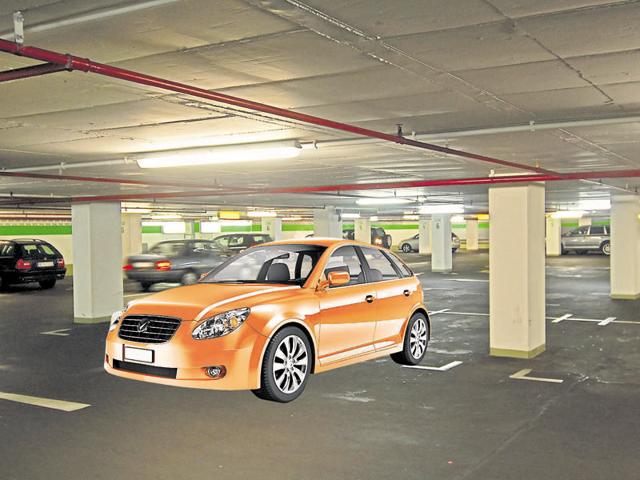Will the real estate bill help developers encroach upon common areas?
Though sale of parking area is not permitted by law, new provisions in the real estate regulation bill might just legitimise it
Homebuyers and activists are crying foul over the parking-related amendment in the proposed Real Estate Regulation Bill (RERB), according to which only open parking areas will be part of common areas and facilities in a group housing project

Common areas are common facilities such as green and other areas for elevators etc used by owners of apartments in housing societies. Many builders and residents of housing societies are usually locked in battles claiming rights over such areas.
According to various apartment and urban area acts and court judgments, builders cannot sell common areas and facilities separately and have to hand these over to the association of apartment owners free of cost once the project gets a completion certificate.
Unfortunately, the Real Estate Regulation Bill, instead of helping homebuyers enforce their rights on the common areas and facilities, will make things difficult for them once enacted in its present form. That’s because Section 2 (N) (iii) of the Bill, while defining the common areas, among various other things also include “the common basements, terraces, parks, play areas, open parking areas and common storage spaces.”
“There will be negative consequences of this type of definition of common areas and facilities, especially when it comes to parking areas. Developers will create open parking in the space meant for green areas and parks,” says a senior consultant from the ministry of housing and poverty alleviation, on conditions of anonymity.”
He also suggests that by associating the word ‘open’ with parking areas, the Bill excludes stilt parking as part of common areas and facilities and thus denying apartment owners claim over the same. Many homebuyers and activists have asked for changes in the definition of common areas and facilities in the Bill, especially when it comes to parking and said if the Bill is passed by the Cabinet in its present form it will legitimise the sale of parking in the stilt area - a space that should belongs by right, and free of cost, to the association of apartment owners.
According to Amit Jain, an activist and a key contributor to the drafting of the Real Estate Regulation Bill, “Now a builder will not only claim exclusive rights over stilt parking, but in future in case FAR (floor area ratio, which allows builders extra space for additional construction in a project) is increased in that area, he can get the stilt area converted to flats and sell them. When FAR is increased in any area, the developer gets the right to construct more apartments on the same piece of land on which he has constructed an apartment earlier. So he wants to control such common areas and make money out of it whenever possible.”
Jain claims to have been shocked to see the “persistence of the builders’ lobby to continue to thwart all our efforts to bring some rationality and sanctity to the otherwise errant real estate sector. We are writing to the prime minister for his personal intervention to ensure that the RERB should be meant for the protection of homebuyers instead of legitimising all the illegalities and issues that we have fought against builders in the past.”
Associating common areas and facilities with parking (in the bill) also contradicts the Supreme Court judgment in Nahalchand Laloochand Private Limited vs Panchali Co-Operative Housing Society Limited case. The apex court, on August 31, 2010, had said that stilt parking was nothing but a part of the common areas and facilities. “…Stilt parking space/s being part of `common areas’ of the building developed by the promoter, the only right that the promoter has, is to charge the cost thereof in proportion to the carpet area of the flat from each flat purchaser.”
A recent judgment from the Delhi High Court in the Anup Mittal vs Kanungo Co-operative Group Housing Society Ltd, while holding that open parking congested common areas and facilities, said, “Air pollution is not the only environmental impact that the vehicles would cause. Parking of the excess cars, especially permanent, in open areas, reduces available open space underneath them for rain water harvesting which enables charging of ground water aquifers - another adverse impact on environment, to which the petitioner could be a contributory.”
Surprisingly, the original draft bill had used the word ‘parking areas.’ However, when the Bill went to the select committee on the Real Estate (Regulation and Development) Bill 2013 of the Rajya Sabha, set up for deliberations and suggestions in the Bill, the committee prefixed the world ‘open’ before the parking areas, for reasons best known to it.
Highlighting the select committee’s observation and recommendations on the definition of common area, the report said, “The Committee desires that the definition of ‘common area’ should be made succinct so as to convey that the ‘common area’ is the entire common place in the project including the open parking, terraces, common facilities …..”
It’s interesting to note that the Union Cabinet chaired by the Prime Minister Narendra Modi has already approved the Real Estate (Regulation and Development) Bill, 2015, as reported by the select committee.
Activists and property owners allege that builder’s lobby is trying to influence the government and provisions amended in their own favour. “It’s sad that government is making changes in the Bill under builders’ pressure. What’s the point of having a legislation to regulate the housing sector if such regulations legitimise illegal practices?,” asks Rahul Mehta, an apartment owner in Noida.





